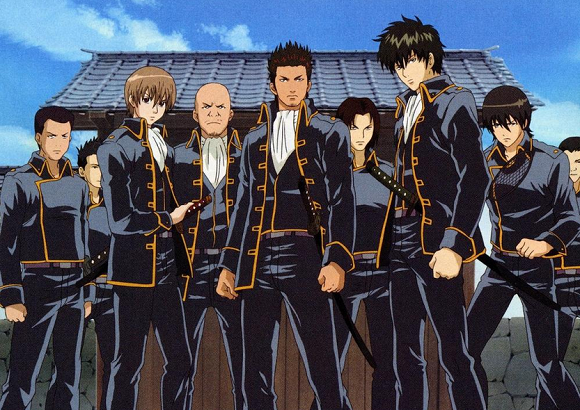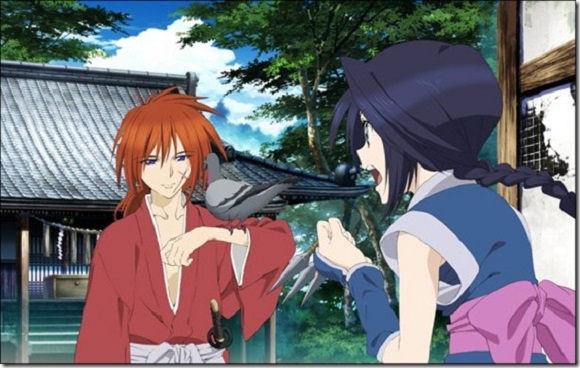
The age of the samurai makes one of the best thematic settings for any Japanese movie or TV show. There are so many great historical figures to profile, and even more fictional characters to imagine ourselves as! We might have the look, but how did they talk? What words did they use?
The Japanese language has a word for this “samurai language” called monofu-go. An accidental de gozaru (samurai for “to be”) and a parting katajikenai (samurai for “grateful” or “indebted”) is only the beginning of being “old school” cool. Well fear not, RocketNews24 brings you level two! Here are four more phrases and words that were used back in the day that will help you expand your monofu-go vocabulary!
Image: Hakuoki Wiki
- Kiden (貴殿)
A word that means “you”, but it’s a respectful way to address your companions or people of higher status than you. It also really shows your affection and admiration for your equals. If you don’t feel that way about your companions or are wondering what the opposite might be, 貴公 (kiko) might come in handy.
- Yannurukana (やんぬるかな)
When you are on the ropes, down and out, and there is no course for victory in sight, get the last word in with this “samurai cool” expression meaning “it’s finished” or “there is no other way”, literally “I give up”. When you can’t go on, and you utter something like “Ahhh, yunnurukana!” perhaps the world will be so impressed with your monofu-go that the winning path will be revealed to you! (Probably not).
Image: Rurouni Kenshin Wiki
- Kokugen (刻限)
This is a word that is used for a “time that has been established or determined” such as “I will be late for our agreed upon time“. In the past, it was especially used as a word meaning “time to separate”. Imagine at the end of the night of drinking with your samurai buddies, you turn to your friends and tell them, “We have drunk to our established time; we must return home.” Your friends will surely be impressed!
- Yakutai mo nai (益体もない)
Literally meaning “there is no benefit/good”, in other word it’s “useless”. It also had the meaning of “boring” or “dull/uninteresting”, a different and cooler way to say tsumaranai. Waiting for the next great samurai anime is certainly yakutai mo nai.
Image: Samurai Deeper Kyo Wiki
Practice these four phrases and you’ll be ready to jump into the next period drama on NHK! During the audition you might say, “Kiden are an amazing director and there is no way I will let the show be yakutai mo nai. It’s going to be so utterly fantastic because there is no such thing as yannurukana!” You will seal the deal with the casting directors with the way you turn to them at the end of the audition and tell them, “Today is already kokugen, but we will see each other again! Katajikenai!” (Disclaimer: RocketNews24 does not guarantee success when using these phrases.)
You might even find that some of these words have survived into the language today. Either way, your life goal of living in the age of the samurai is going to come true…de gozaru!
For another look at how modern Japanese differs from samurai Japanese, check out this video below!
▼Our favorite Totoro song transcribed into samurai language. Goodbye katakana words!
Source: Hachima Kiko
Top Image: Gintama Wiki




 Burger King Japan unleashes red burgers and Angry Sauce on my stomach 【Taste test】
Burger King Japan unleashes red burgers and Angry Sauce on my stomach 【Taste test】 Samurai Toothpicks with bite-sized language lessons will help you look and sound like a swordsman
Samurai Toothpicks with bite-sized language lessons will help you look and sound like a swordsman Samurai Studio: Tokyo’s new photo studio where you can get your picture taken in samurai armor
Samurai Studio: Tokyo’s new photo studio where you can get your picture taken in samurai armor Samurai backpacks from Kyoto combine lamellar tradition, awesome style, and modern functionality
Samurai backpacks from Kyoto combine lamellar tradition, awesome style, and modern functionality A visit to Japan’s cat beautiful, quirky, and touching cat temple, Unrinji【Photos】
A visit to Japan’s cat beautiful, quirky, and touching cat temple, Unrinji【Photos】 Disney princesses get official manga makeovers for Manga Princess Cafe opening in Tokyo
Disney princesses get official manga makeovers for Manga Princess Cafe opening in Tokyo Beautiful new Final Fantasy T-shirt collection on the way from Uniqlo【Photos】
Beautiful new Final Fantasy T-shirt collection on the way from Uniqlo【Photos】 Foreign English teachers in Japan pick their favorite Japanese-language phrases【Survey】
Foreign English teachers in Japan pick their favorite Japanese-language phrases【Survey】 Randomly running into a great sushi lunch like this is one of the best things about eating in Tokyo
Randomly running into a great sushi lunch like this is one of the best things about eating in Tokyo Is the new Shinkansen Train Desk ticket worth it?
Is the new Shinkansen Train Desk ticket worth it? Kyushu-exclusive Black Mont Blanc goes nationwide in a “Special” way
Kyushu-exclusive Black Mont Blanc goes nationwide in a “Special” way Hey, Japanese taxi driver! Take us to your favorite restaurant in Tsuruga City!
Hey, Japanese taxi driver! Take us to your favorite restaurant in Tsuruga City! Osaka’s creepy cute mascot speaks for first time, adds more fuel the creepy OR cute debate【Video】
Osaka’s creepy cute mascot speaks for first time, adds more fuel the creepy OR cute debate【Video】 We try out “Chan Ramen”, an underground type of ramen popular in the ramen community
We try out “Chan Ramen”, an underground type of ramen popular in the ramen community New Japanese mascot character: A train station monster that grabs children who don’t mind the gap
New Japanese mascot character: A train station monster that grabs children who don’t mind the gap New Studio Ghibli bedding sets are cool in all senses of the word
New Studio Ghibli bedding sets are cool in all senses of the word Our Japanese reporter visits Costco in the U.S., finds super American and very Japanese things
Our Japanese reporter visits Costco in the U.S., finds super American and very Japanese things New Pokémon cakes let you eat your way through Pikachu and all the Eevee evolutions
New Pokémon cakes let you eat your way through Pikachu and all the Eevee evolutions There’s a park inside Japan where you can also see Japan inside the park
There’s a park inside Japan where you can also see Japan inside the park Japanese convenience store packs a whole bento into an onigiri rice ball
Japanese convenience store packs a whole bento into an onigiri rice ball Hanton rice — a delicious regional food even most Japanese people don’t know about, but more should
Hanton rice — a delicious regional food even most Japanese people don’t know about, but more should Final Fantasy, Kingdom Hearts, and Dragon Quest pet product line announced by Square Enix
Final Fantasy, Kingdom Hearts, and Dragon Quest pet product line announced by Square Enix Studio Ghibli releases Kiki’s Delivery Service chocolate cake pouches in Japan
Studio Ghibli releases Kiki’s Delivery Service chocolate cake pouches in Japan Japan’s bone-breaking and record-breaking roller coaster is permanently shutting down
Japan’s bone-breaking and record-breaking roller coaster is permanently shutting down New definition of “Japanese whiskey” goes into effect to prevent fakes from fooling overseas buyers
New definition of “Japanese whiskey” goes into effect to prevent fakes from fooling overseas buyers Foreign passenger shoves conductor on one of the last full runs for Japan’s Thunderbird train
Foreign passenger shoves conductor on one of the last full runs for Japan’s Thunderbird train Kyoto bans tourists from geisha alleys in Gion, with fines for those who don’t follow rules
Kyoto bans tourists from geisha alleys in Gion, with fines for those who don’t follow rules Studio Ghibli unveils Mother’s Day gift set that captures the love in My Neighbour Totoro
Studio Ghibli unveils Mother’s Day gift set that captures the love in My Neighbour Totoro Domino’s Japan now sells…pizza ears?
Domino’s Japan now sells…pizza ears? Toyota built a life-sized Miraidon Pokémon and are letting people test drive it this weekend
Toyota built a life-sized Miraidon Pokémon and are letting people test drive it this weekend New Japanese KitKat flavour stars Sanrio characters, including Hello Kitty
New Japanese KitKat flavour stars Sanrio characters, including Hello Kitty Sales of Japan’s most convenient train ticket/shopping payment cards suspended indefinitely
Sales of Japan’s most convenient train ticket/shopping payment cards suspended indefinitely Sold-out Studio Ghibli desktop humidifiers are back so Totoro can help you through the dry season
Sold-out Studio Ghibli desktop humidifiers are back so Totoro can help you through the dry season Japanese government to make first change to romanization spelling rules since the 1950s
Japanese government to make first change to romanization spelling rules since the 1950s Ghibli founders Toshio Suzuki and Hayao Miyazaki contribute to Japanese whisky Totoro label design
Ghibli founders Toshio Suzuki and Hayao Miyazaki contribute to Japanese whisky Totoro label design Doraemon found buried at sea as scene from 1993 anime becomes real life【Photos】
Doraemon found buried at sea as scene from 1993 anime becomes real life【Photos】 Tokyo’s most famous Starbucks is closed
Tokyo’s most famous Starbucks is closed One Piece characters’ nationalities revealed, but fans have mixed opinions
One Piece characters’ nationalities revealed, but fans have mixed opinions We asked a Uniqlo employee what four things we should buy and their suggestions didn’t disappoint
We asked a Uniqlo employee what four things we should buy and their suggestions didn’t disappoint Princesses, fruits, and blacksmiths: Study reveals the 30 most unusual family names in Japan
Princesses, fruits, and blacksmiths: Study reveals the 30 most unusual family names in Japan Studio Ghibli’s new desktop Howl’s Moving Castle will take your stationery on an adventure
Studio Ghibli’s new desktop Howl’s Moving Castle will take your stationery on an adventure Kanji fail – Japanese World Cup fans notice Greek player’s strange tattoo
Kanji fail – Japanese World Cup fans notice Greek player’s strange tattoo Samurai trash collectors clean streets of Tokyo in dramatic fashion 【Videos】
Samurai trash collectors clean streets of Tokyo in dramatic fashion 【Videos】 Awesome Samurai Armor Hoodies are looking to conquer the whole world/keep you warm
Awesome Samurai Armor Hoodies are looking to conquer the whole world/keep you warm Samurai in full armor doing extreme sports has passersby, internet watching in awe【Video】
Samurai in full armor doing extreme sports has passersby, internet watching in awe【Video】 “Katana steel cookies” are the latest sweet treat from Japan’s samurai sword capital【Taste test】
“Katana steel cookies” are the latest sweet treat from Japan’s samurai sword capital【Taste test】 Samurai C-3PO is the Japanese warrior droid we’ve all been waiting for
Samurai C-3PO is the Japanese warrior droid we’ve all been waiting for Niigata school superintendent resigns over improper use of Japanese word for “you”
Niigata school superintendent resigns over improper use of Japanese word for “you” PanTea? This pair of granny panties in a teapot can be yours for only 1 million yen!
PanTea? This pair of granny panties in a teapot can be yours for only 1 million yen! KFC’s Colonel Sanders is becoming a samurai in Japan this week
KFC’s Colonel Sanders is becoming a samurai in Japan this week Tokyo’s new samurai photo studio sends you to Japan’s feudal era with awesome digital backdrops
Tokyo’s new samurai photo studio sends you to Japan’s feudal era with awesome digital backdrops AI Samurai: The artificially intelligent, armored samurai that will answer all your questions
AI Samurai: The artificially intelligent, armored samurai that will answer all your questions Get your battle armor ready for the interactive “hottie” Samurai & Ninja Show coming to Tokyo
Get your battle armor ready for the interactive “hottie” Samurai & Ninja Show coming to Tokyo Cup Noodle commercial reveals that the samurai still exist, love idol music
Cup Noodle commercial reveals that the samurai still exist, love idol music Kyoto yakiniku restaurants offer up blue meat and drinks for Japan’s World Cup fever
Kyoto yakiniku restaurants offer up blue meat and drinks for Japan’s World Cup fever People in some parts of Japan now legally allowed to smile for their driver’s license photos
People in some parts of Japan now legally allowed to smile for their driver’s license photos
Leave a Reply